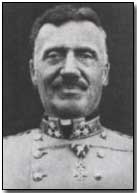Who's Who - Karl von Pflanzer-Baltin
 Karl von Pflanzer-Baltin
(1855-1925) was initially one of Austria-Hungary's more successful field
commanders during World War One, brought back in 1914 from retirement to
command the new Austro-Hungarian Seventh Army.
Karl von Pflanzer-Baltin
(1855-1925) was initially one of Austria-Hungary's more successful field
commanders during World War One, brought back in 1914 from retirement to
command the new Austro-Hungarian Seventh Army.
Born on 1 June 1855 in Pec, Hungary, Pflanzer-Baltin graduated from the Theresa Military Academy in 1875 before attending the War Academy from 1879-80.
His military service prior to the outbreak of war in 1914 was varied: aside from field commands he served on the general staff, a spell as an instructor at the War Academy and was Chief of Staff to XII Corps.
Considered likely to be given a corps command in 1911 his ongoing poor health caused him to be sent instead to Vienna as Inspector General of the Corps Officer Schools. Hardly an eminent position, Pflanzer-Baltin understandably requested early retirement in June 1914, one month before the European July Crisis.
With Austria-Hungary's declaration of war against Serbia in late July 1914, followed by general European war, Pflanzer-Baltin was dug out of retirement in October 1914 and promoted General of Cavalry when handed command of the newly-created Seventh Army (a corps until its army designation in May 1915), destined to occupy the southern sector of the Eastern Front after the army's opening Galician campaign.
Unlike many other Austro-Hungarian armies, Seventh Army - consisting of Hungarian and Croat troops - was largely free from problems of morale and discipline common elsewhere - and rapidly established an enviable reputation for reliability.
Pflanzer-Baltin's command of his army up until the summer of 1916 was sure-footed, experiencing notable successes in the eastern Carpathians and in the Bukovina. Pflanzer-Baltin proved able, unlike many of his contemporaries in the Austro-Hungarian army, of adapting to trench and alpine fighting conditions.
Pflanzer-Baltin's career was overshadowed however by the spectacular success of the June 1916 Russian Brusilov Offensive, in which Seventh Army was overwhelmed - at least partly through tactical errors committed by Pflanzer-Baltin - and forced out of East Galicia.
Despite this disaster Pflanzer-Baltin remained in command of Seventh Army when it was reformed in July 1916 under German supervision. Nevertheless Pflanzer-Baltin's scope for command decisions was greatly reduced with the appointment of the German Hans von Seeckt as controlling Chief of Staff.
Relieved of command entirely in September 1916 he was recalled in July 1918 and given command of Austro-Hungarian forces in Albania, having been in charge of new recruits since March 1917.
Based in the mountains news of the armistice was so slow in reaching Pflanzer-Baltin that he only finally surrendered to Allied forces on 18 November: the final act of the Austro-Hungarian army.
He retired from military service on 1 December 1918 and died on 8 April 1925 aged 69.
In WW1 an "ace" was a pilot who scored five confirmed "kills".
- Did you know?
